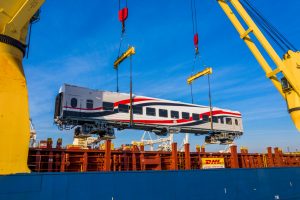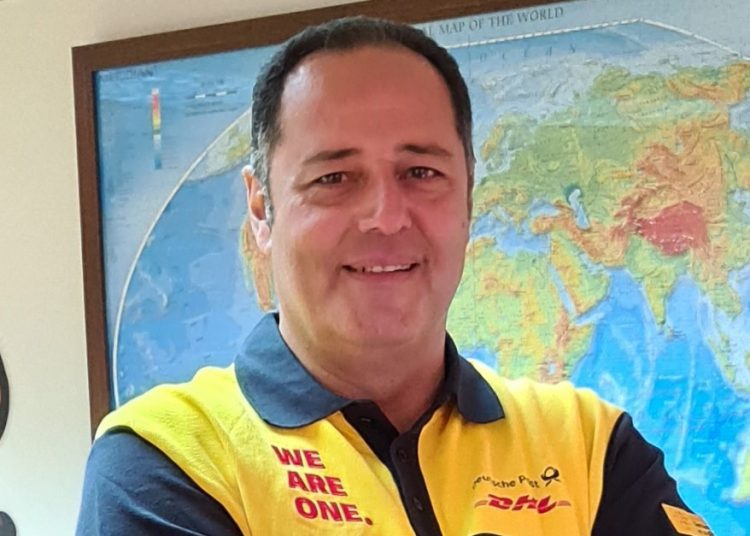(Exclusive)
By Hamed Mahmoud
Magued Ragheb, Country Manager of DHL Global Forwarding, Egypt, revealed that the Egyptian investment climate has improved significantly in the past few years.
In an interview with The Egyptian Gazette Newspaper, he noted that following the novel coronavirus (Covid-19) pandemic, Egypt remains on track to becoming one of the largest economies in the world within a decade

- Can you tell us about DHL Global Forwarding’s involvement in the Egyptian National Railway project?
The Egyptian National Railway project is an important infrastructure development for Egypt that will improve the public rail network system and the lives of millions of people who will benefit from it. The role of DHL Industrial Projects is to support Dunakeszi Járműjavító Kft with the transport of 676 passenger coaches from Dunakeszi, Hungary, to Egypt within a period of 32 months starting from 10th February.
DHL will manage the end-to-end transport of the coaches, each weighing 48 tones (equivalent to approximately 72 camels) and measuring 24.5 metres in length, as well as 4.5 metres in height. Packaged for export, the coaches are transported via rail to the port of Koper, Slovenia, where DHL is integrating the cargo via its charter carriers. From there, DHL will deliver the cargo via sea directly onto the railway network at the port of Alexandria in Egypt.
- How did DHL Global Forwarding come to be selected for this project?
DHL Industrial Projects is a unit of DHL Global Forwarding that manages complex project logistics, deep sea chartering activity and heavy-lift cargo.DHL Industrial Projects was selected due to our expansive global network and knowledge of ports, roads, infrastructure, equipment and regulations, and experience operating in challenging and remote environments, as well as our commitment to safe, compliant and secure operations.
- Covid-19 has had an impact on all industries including logistics. How has DHL Global Forwarding mitigated the challenges brought by the pandemic thus far?
At DHL Global Forwarding, we are fully committed to helping our customers navigate these challenging times and to find the best logistics solutions to mitigate the impact on their supply chains such as offering alternative transportation or storage solutions. We are in constant contact with all our customers and regularly inform them about delays or changes in routing on a real-time basis.
Our investment in digitalisation from years ago has paid off, and is proving to be a value-add to our customers in this turbulent climate. For instance, we launched myDHLilast year – the only fully integrated online platform for freight forwarding customers, to access online services for full shipment visibility and control on one platform. MyDHLi provides complete visibility in the management of freight rates, offers, transport modes, carbon emissions, and all other relevant shipment data. The highly intuitive use interface makes it easy to use and ensures that customers have all relevant information at hand. It also features common social media functions like follow and share, and relevant information can be easily accessed across organisations and shared with trading partners. We have also completed the rollout of our Transport Management System, CargoWise One in the region, which connects customers to DHL’s entire transport network on air and sea freight, offering improved shipment visibility and customer experience in terms of speed of response and service quality.
We have also fully rolled out Saloodo!, our digital road freight solution platform, in the region, to inject greater transparency, real time visibility and efficiency to the regional road network. Saloodo! enables shippers to identify trusted and reliable freight carriers, and in turn, help carriers manage existing fleets and optimise capacity with full-truckload shipments.
- Going forward, how do you see the logistics industry developing in Egypt and the GCC?
The pandemic has certainly dealt a heavy blow to the sector, especially early on when freight capacity was scarce due to border restrictions. While supply of capacity is gradually improving, we do not anticipate it to return to pre-Covid level so soon. Despite this, we do not anticipate that supply chains will “drastically” change post-Covid as business models have been evolving for some time now.
The Egyptian logistics expenditure is expected to cross USD 50 billion by 2024, according to Mordor Intelligence. Egypt is set to become a major trading market, creating a wide range of opportunities for the logistics sector as the government aims to make the country a production and distribution hub to serve Europe, the Middle East and Africa. In addition to infrastructure developments and investments in the transportation network, the increase in market penetration of companies and construction activities is expected to create demand for project and contract logistics.
To ensure that critical logistical operations continue to support the immediate and long term societal needs in the country, the logistics sector is expected to accelerate digital transformation with technological investment, such asthe automation of physical processes and facilities, to reduce labur-intensive processes as well as incorporation of work force flexibility.
- What plans do you have in Egypt in the future?
We remain guided by our Strategy 2025– “Delivering Excellence in a Digital World” with a focus on the four main trends impacting the logistics industry – digitalisation, sustainability, ecommerce and globalisation. Digitalisation will be a key focus point not just in Egypt but globally, as customers demand more transparency throughout the entire supply chain. We expect that digitalisation will accelerate and push the sector into the next phase of growth as we realise the benefits of technology in automating monotonous tasks or increasing productivity and efficiency in logistical and administrative processes.
Beyond digitalisation, we will continue to harness the strength of our core logistics capabilities to enable globalisation and the growth of the e-commerce industry. We’ll also remain committed to being a responsible logistics player by aiming to reach zero logistics-related carbon emissions by 2050. As of January this year, we have also begun to neutralise the carbon emissions of all less-than-container load (LCL) ocean freight shipments.
- Is there anything else you would like to add?
2020 was an exceptionally challenging year for the world, and despite it all, we have grown considerably as a company, thanks to our resilience, adaptability and efforts from our teams worldwide. We remain strongly committed to enabling customers in Egypt as well as the region, reach international markets, to maximise their growth potential. Our customers can continue to expect the best from our global network, and team of experts who has intrinsic knowledge of the local market and global trends.






Discussion about this post